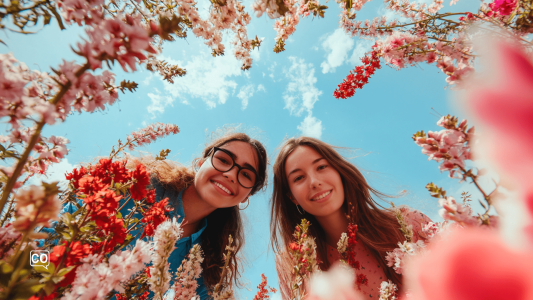Mira esas flores

Learning goals:
- Situation: Aprende los nombres básicos de las flores (Learn the basic flowers' names)
- Verb: Plantar (to plant) - Presente, indicativo (Present, indicative)
- Verb: Plantar (to plant) - Pretérito perfecto, indicativo (Present Perfect, indicative)
- Verb: Regalar (to gift) - Presente, indicativo (Present, indicative)
- Verb: Regalar (to gift) - Pretérito perfecto, indicativo (Present Perfect, indicative)
-
Grammar: E relativo
"que" (The relative "que") - Culture: El clavel: la flor nacional de España (The carnation: the national flower of Spain)
Learning module 2 (A2): Naturaleza y medio ambiente (Nature and environment)
Teaching guidelines +/- 60 minutes
Exercises
These exercises can be done together during conversation lessons or as homework.
Exercise 1: Find the words
Instruction: Find the words, mark them and make sentences with the words.
Show answers Show hintsHints
The carnation , The daisy , The sunflower , The poppy , To plant , The bouquet of flowers
Answers
Score: 0/6
| La amapola | (The poppy) |
| Plantar | (To plant) |
| El ramo de flores | (The bouquet of flowers) |
| El clavel | (The carnation) |
| La margarita | (The daisy) |
| El girasol | (The sunflower) |
Exercise 2: Reorder sentences
Instruction: The words in these sentences have been shuffled! Sort them so that they make a valid sentence again and translate.
Show answers Show translationExercise 3: Translate and use in a sentence
Instruction: Translate and say the word out loud. Use the word in a sentence.
Show translation|
1.
El narciso
|
(The daffodil) |
|
2.
La rosa
|
(The rose) |
|
3.
El ramo de flores
|
(The bouquet of flowers) |
|
4.
Regalar
|
(To gift) |
|
5.
La amapola
|
(The poppy) |
|
6.
La orquídea
|
(The orchid) |
|
7.
La margarita
|
(The daisy) |
|
8.
El girasol
|
(The sunflower) |
Exercise 4: Translate and make sentences
Instruction: Translate the words and phrases below and use it in a conversation or text.
Show answersExercise 5: Conjugación verbal
Instruction: Choose the correct word, read the sentence out loud and translate.
Show answers Show translationRegalar (Presente, indicativo), Regalar (Pretérito perfecto, indicativo), Plantar (Presente, indicativo), Plantar (Pretérito perfecto, indicativo)
1. Yo ... flores en el jardín.
2. Nosotros le ... flores de la floristería.
3. Él ... rosas en su jardín.
4. Nosotros ... rosas en el parque.
5. Ellos te ... un ramo de tulipanes.
6. Yo le ... rosas a mi novia.
7. Yo ... árboles en el bosque.
8. Él nos ... tres floreros.
Exercise 6: The relative "que"
Instruction: Choose the correct word, read the sentence out loud and translate.
Show answers Show translationtiene, está, plantas, plantado, vemos, visitamos, comprado, regalado, necesito
1. Plantar: El tulipán que ... te va a gustar.
2. Regalar: El ramo de flores que me han ... tiene muchas rosas.
3. Ver: La amapola que ... en el parque es muy pequeña.
4. Estar: La margarita que ... en tu jardín es muy bonita.
5. Regalar: El girasol que me has ... no me gusta.
6. Tener: La orquídea que ... Marta es azul.
7. Necesitar: El florero que ... tiene que ser muy grande.
8. Visitar: La floristería que ... siempre tiene precios muy buenos.
9. Plantar: El narciso que hemos ... es mi flor favorita.
10. Comprar: El jazmín que hemos ... está en el balcón.
Exercise 7: Translate and make sentences
Instruction: Translate the words and phrases below and use it in a conversation or text.
Show answers